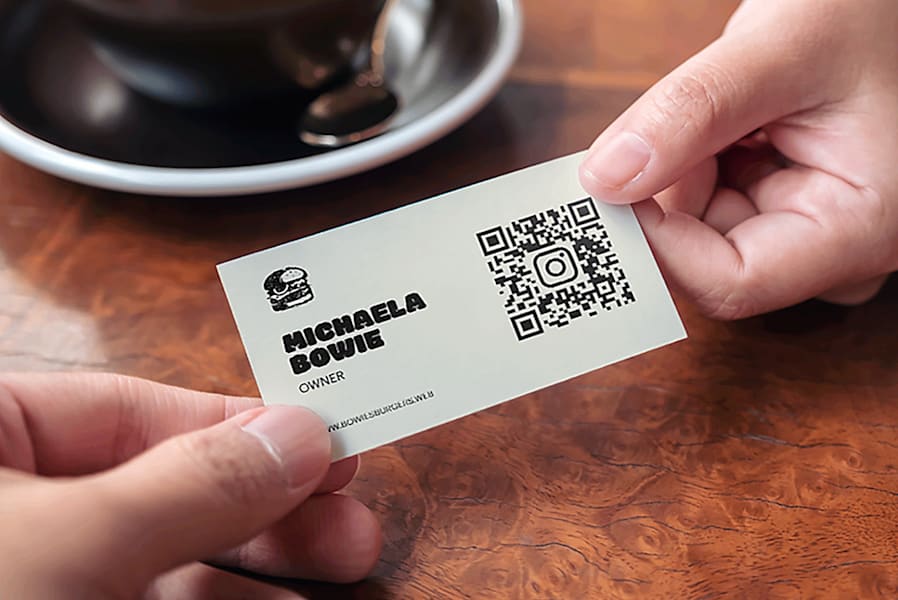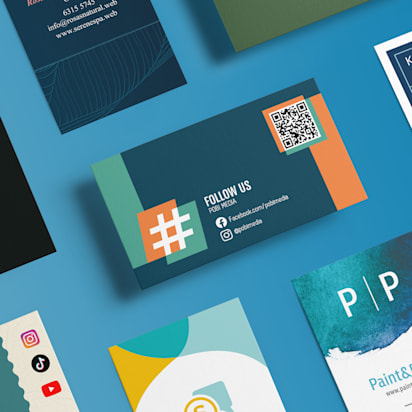Here’s one of our favourite business card insights to spice up your next meeting: what percentage of employed and self-employed professionals still use business cards? Surprise! It’s 78%. Business cards remain popular because that little rectangle is something people can feel, and now scan. It’s still the fastest, friendliest way to say, “Let’s keep in touch”.
Our new survey of 800 working professionals from across the U.S. shows how physical cards still carry an impact. QR codes and NFC chips are turning every handshake into a ‘best of both worlds’ moment: tangible presence plus instant phone-ready info. The next few sections unpack the freshest business card insights of 2025, complete with design tips and quick-win tactics you can swipe today. Discover how business cards can still boost your networking in a digital world.
- Cards remain a powerhouse. 78% of working professionals rely on them regularly, with Gen Z carrying the torch with the highest use (55%).
- Hybrid options are heating up. QR codes appear on 36% of printed cards, and 30% of professionals juggle both physical and digital formats.
- Design is essential. Clean layouts (62%) and bold branding (55%) rule, while premium textures (41%) give a luxe feel that sticks.
- Price still matters. 45% prioritise affordability, but 37% won’t budge on high-quality stock, Gen Z adds ‘fast delivery’ and ‘sustainability’ to the must-have list.
- Tech earns its keep. Easy contact saving (57%) and updatable info (56%) prove QR/NFC aren’t just shiny extras, they’re incredibly functional.
- Cards close deals. 76% credit a memorable card with opening business doors.
Business card insights: key trends from our survey
Using insights from a survey of 800 working professionals from across the U.S. who use business cards, we will explore and uncover how design preferences, tech integrations (like QR codes and NFC) and card ordering behaviours are evolving.
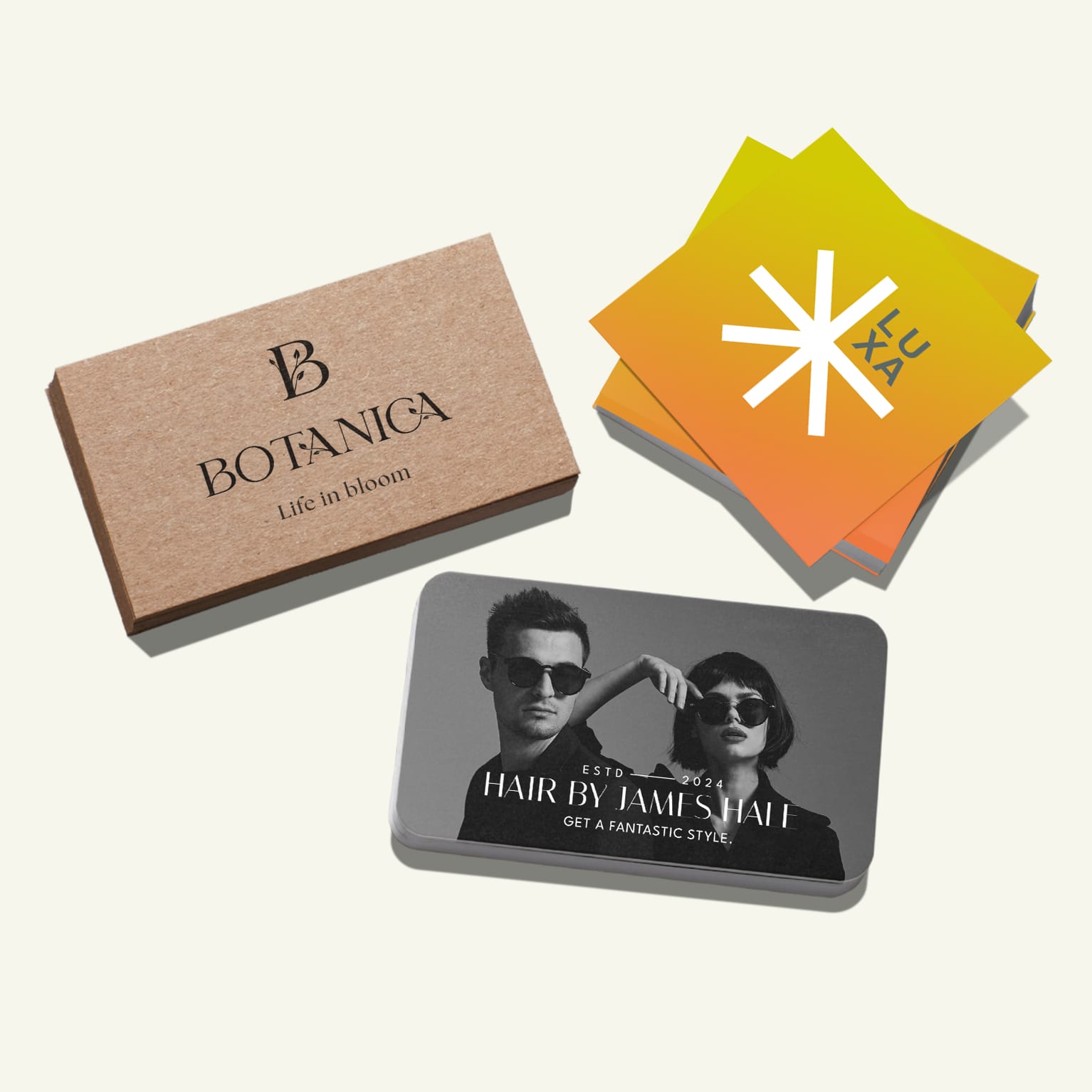
The relevance of business cards: real-world reach in every generation
Among professionals already in the business card game, 78% still hand them out at least occasionally, and more than half do so weekly.
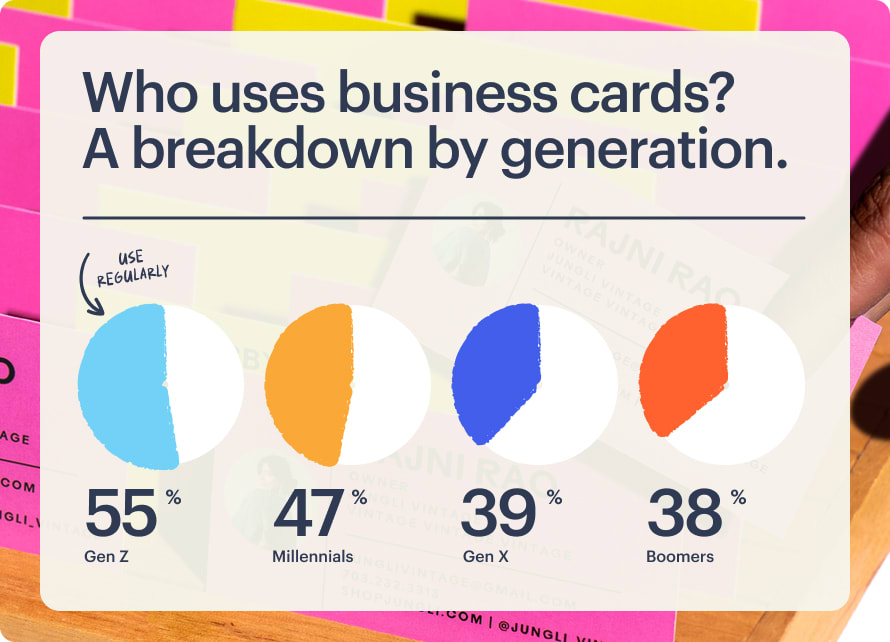
Gen Z’s 55% weekly usage is the highest of any age demographic. They grew up with both smartphones and scrapbooks, so they value tangible ‘leave-behinds’ that stand out in an endless scroll. Meanwhile, Boomers remain steady at 38% weekly use, reflecting decades-deep habits of sliding cards across boardroom tables.
Why does a 85 x 55 mm rectangle still work for business? It compresses your elevator pitch into an object people can tuck in a wallet, pin to a corkboard or photograph on the spot. The physicality triggers memory far better than yet another push notification.
And yes, gender differences come up. Men report more frequent use at 51% compared to women’s 36%. Yet women compensate with strategic timing, deploying cards at curated moments like at the end of a pitch or at an art show opening, where a single exchange can spark high-value collaborations. Despite the different tactics, they have the same outcome — lasting connections.
From a brand-building angle, these findings validate ongoing business card use across industries. Even if your business happenings live online, the handshake plus card handover plants an emotional anchor that algorithms can’t replicate.
Hybrid formats gaining traction: QR codes hit the mainstream
Traditional paper still dominates at 60% overall (and an impressive 76% among Boomers), but the static rectangle is learning new tricks. Instead of treating print and digital as separate galaxies, forward-thinking pros splice them together. QR-enhanced cards now land in 36% of pockets, and nearly one-third of our entire sample toggles between physical and digital options depending on context.
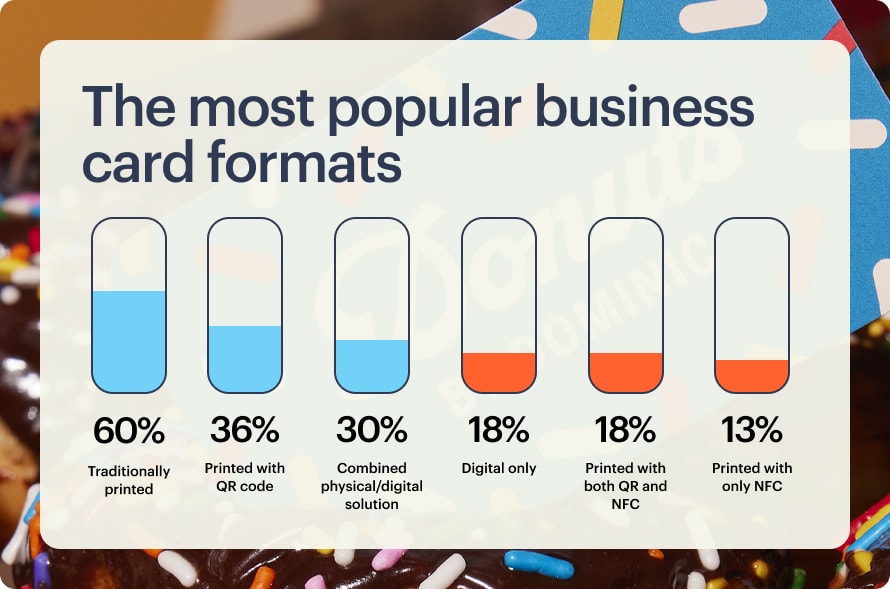
Gen Z, unsurprisingly, is leading that charge: 51% embed QR codes. Imagine scanning a black-on-fluorescent-green code on a fashion designer’s card and jumping straight into a 3D runway video. That interactivity shortens discovery time and keeps momentum alive after the coffee chat ends.
Digital business cards are also becoming a popular choice. Check out VistaPrint’s guide to digital business cards for more info.
Young pros also champion NFC plastic business cards, the tap-to-save cousins of QR. While overall adoption sits at around 14%, Gen Z adoption is double that. Why? Because one tap can auto-populate a phone’s contacts app, complete with pronouns, personal logos and a link to a networking profile. No more typos. No more “Wait, how do you spell your last name?” friction.
For small businesses, layering QR/NFC atop classic business card uses offers the safest bet. Less digitally savvy people can ignore the tech and still read your number, while digital natives can jump straight into your latest TikTok. That flexible approach future-proofs a single card design for multigenerational audiences.

Design matters
Think of your business card as a mini billboard. Every design choice shouts something about you: slick minimalist? Earth-loving artisan? Vintage letterpress nerd?
Whatever your style, the survey left no doubt: prioritise clarity with your design. A clean and organised layout is the most valued feature in physical business cards (62%). A roomy layout with legible fonts whispers confidence and sophistication. Nobody wants to squint at an 8-point serif after a few espressos at a trade show. A close second is brand visibility with 55% of respondents saying it’s a critical factor. Then there’s the feel factor: premium materials lure 41% of users.
If you’re hungry for more business card design ideas, VistaPrint’s Ideas & Advice section and template library have lots of great options for inspiration.
Cost and quality drive purchasing
Money still talks. 45% of respondents place affordable pricing at the top of their ordering checklist. But here’s the twist: 37% simultaneously rank high-quality stock as a deal-breaker. That value sweet spot is exactly why business card holders should look for tiered paper catalogues, matte, gloss or soft-touch finishes and even recycled paper options.
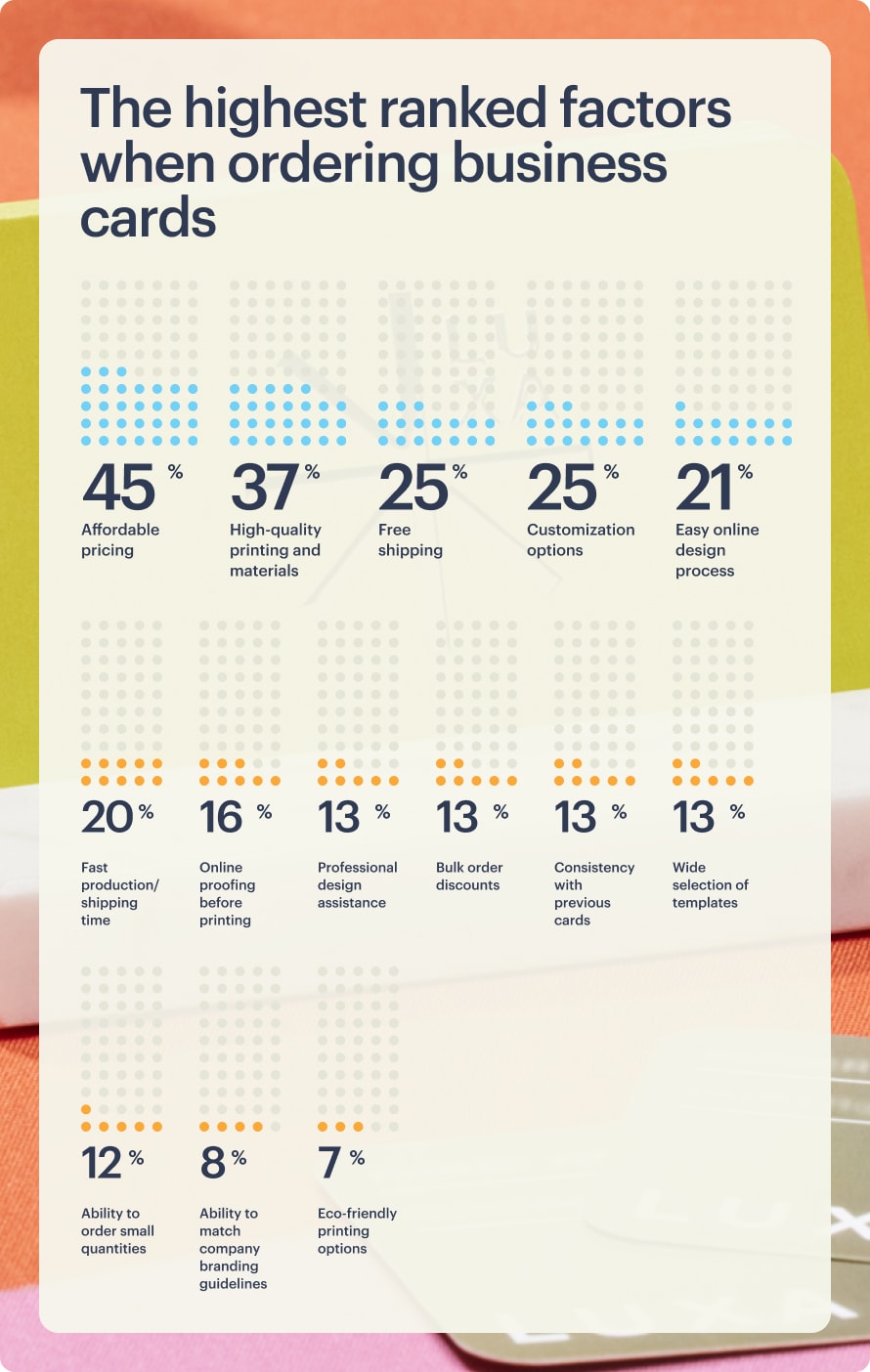
Customised perks like free delivery or no-minimum experimental runs (both cited by 25%) also go a long way.
Gen Z piles two extra priorities into the mix: fast delivery (31%) and sustainability (31%). A merch designer in London, for example, could order a rush matte batch for an imminent trade show while simultaneously scheduling an eco-kraft reorder for later events. That way, they stay nimble without compromising their values or missing deadlines.
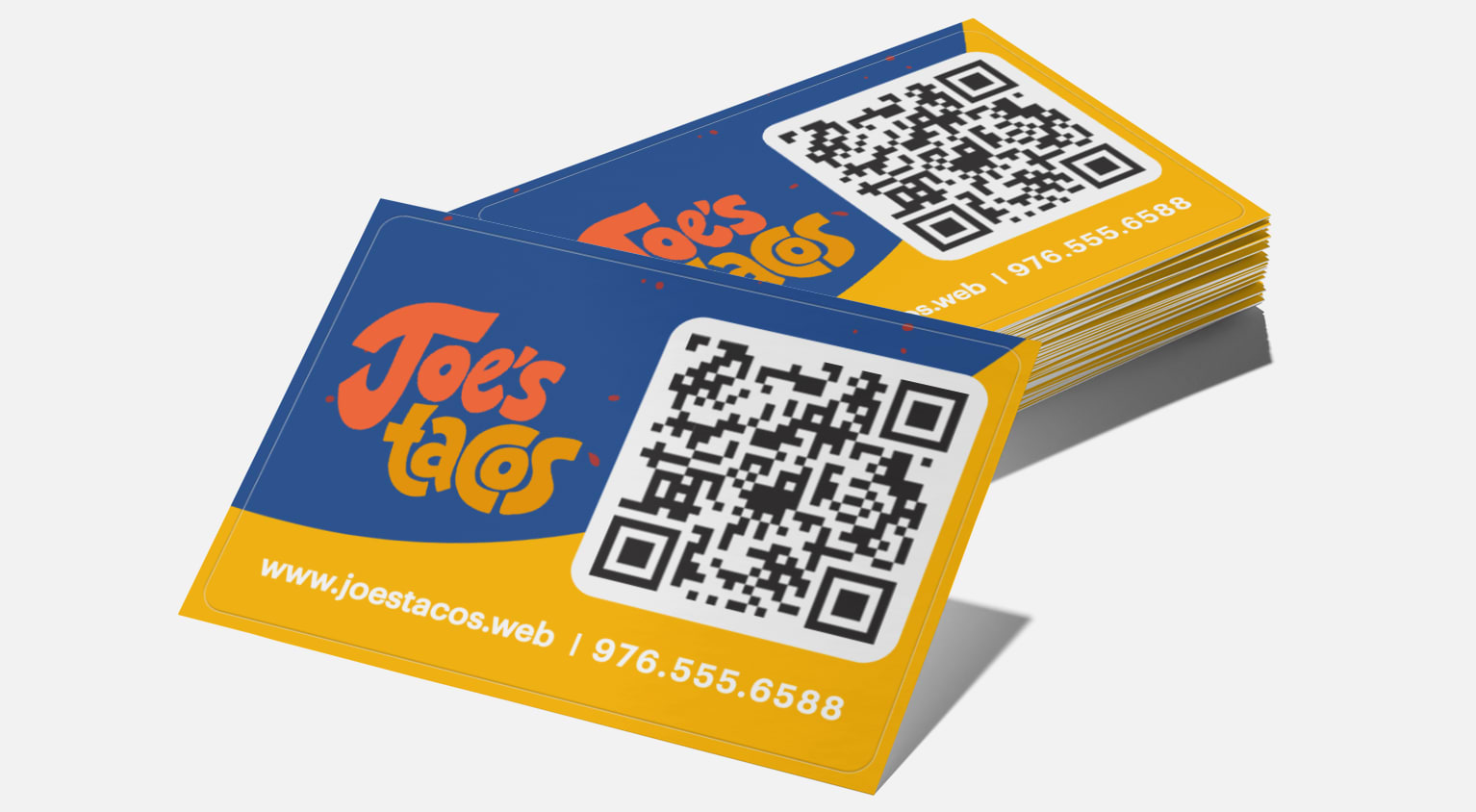
Tech adds tangible value
A QR code or NFC chip used to be a novelty, now it’s a common aspect of modern networking. Our respondents cited the three top digital features as: easy contact saving (57%), updatable info (56%) and expanded information sharing (55%).
There are real-world perks to digital business cards:
- Instant credibility: The moment they scan, a branded microsite pops up with your logo, verified contact details and a one-click hop to your preferred networking profile, serving trust on first sight.
- Data freshness: Promotions, pivots or phone number changes no longer mean you’ll be recycling entire batches. Instead you can just update the linked landing page.
- Space saver: Keep your card face clean, stash the video pitch, case study PDF or scheduling embed behind a scan.
- Engagement stats: Link-shortener dashboards reveal who scanned, when and how often. This gives your Customer Relationship Management (CRM) new lead-scoring fuel.
Cards support real business outcomes
According to our survey, 76% of professionals say a well-designed card directly boosted their career or revenue. Let’s unpack what ‘boosted’ means:
- Easier follow-ups (32%): Recipients locate your email instantly, helping to nudge deals across the finish line faster.
- Increased memorability (28%): Distinctive stock or colour schemes stick like a catchy jingle.
- Stronger first impressions (27%): Confident design telegraphs confident service, making next-step asks feel natural.
Even more intriguing: Gen Z’s impact score climbs to 84%.
Matching digital and physical design appeals to most
Branding works like an ecosystem, every piece, from the footer in an email to the tissue paper in a merch box, either reinforces or dilutes the story you’re trying to tell. Little wonder then, that 94% of professionals want their physical and digital business cards to share the same look, and nearly half of them say that harmony is very important. Gen Z pushes the standard even higher, with 59% calling design alignment a flat-out requirement rather than something that’s nice to have.
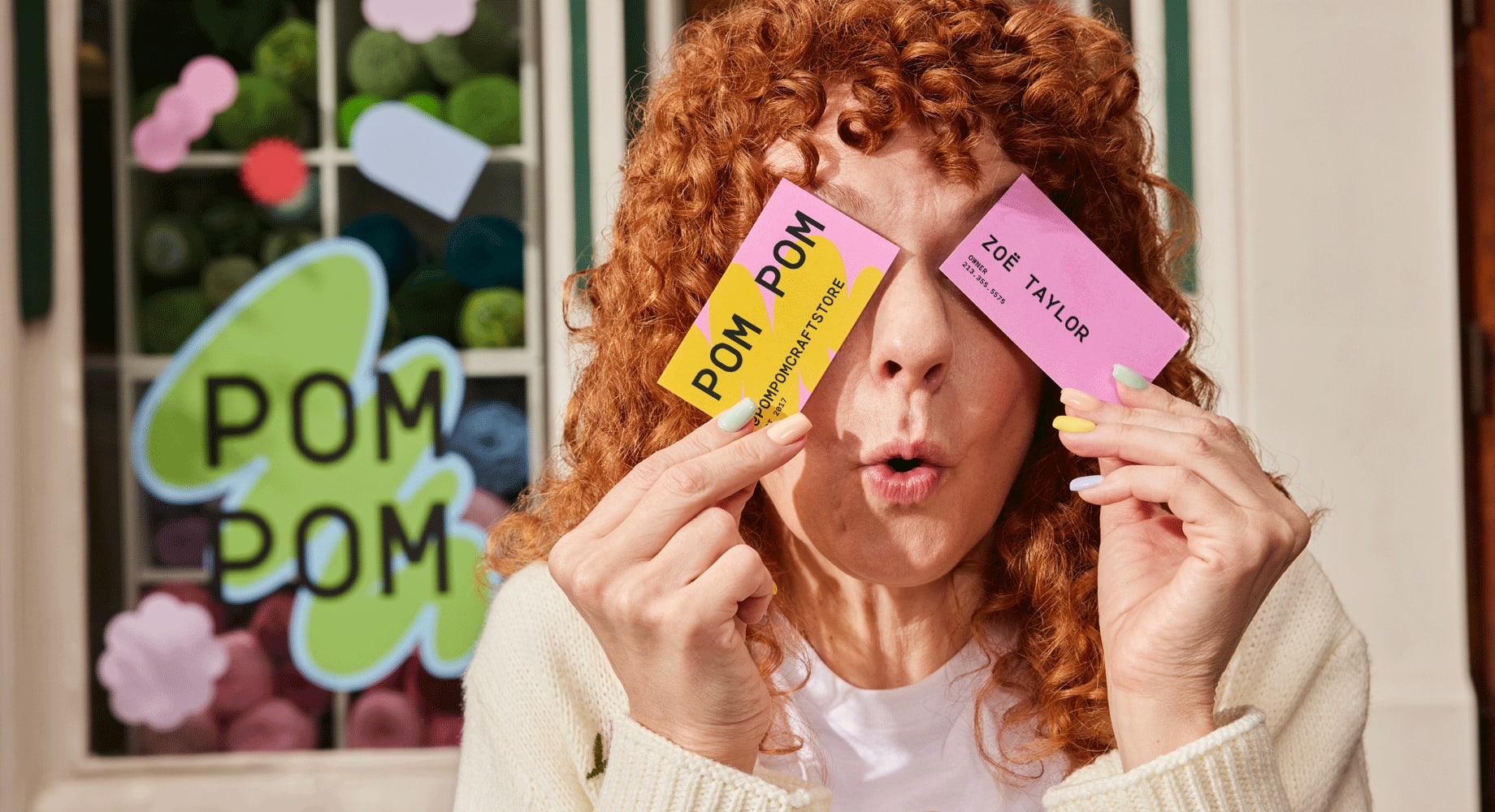
Merge the past with the future
In the modern digital world scrolling fatigue hits hard, but when it comes to making business connections, a business card still delivers a real-world experience that no push notification can match. The latest business card insights prove that the tactile handshake isn’t just nostalgia, it’s a valued personal interaction. Adding a QR or NFC to your business card amplifies that chemistry, turning a keepsake into a knowledge portal.
Three core truths emerged from the data:
- Classic still connects. The act of handing something over roots you in the moment and signals respect.
- Tech multiplies reach. Scannable features collapse the gap between “Nice to meet you” and “Here’s my proposal”.
- Design drives action. Clean layouts, lush textures and bold branding convert introductions into invoices.
Whether you’re craving minimalist ivory letterpress, eco-chic kraft or a neon plastic tap-card, business card creator platforms like VistaPrint let you experiment with business card sizes, stocks and tech add-ons without destroying your budget. Drag-and-drop templates, FSC® certified paper, rush delivery, dynamic QR codes — it’s all baked in.
So print that first batch or refresh your fifteenth. Embed a QR to your podcast, foil stamp your new logo, play with soft-touch velvet stock and sync everything with your email signature. This year and beyond, unique business cards won’t just introduce you, they’ll guide, nurture and convert.
Methodology
This survey was conducted online between 19 May–20 May 2025, with a representative sample of 800 respondents located in the United States.
Age filters:
- 18–27 (Gen Z)
- 28–43 (Millennial)
- 44–59 (Gen X)
- 60–78 (Boomers)
- 79–85 (Post-War)
